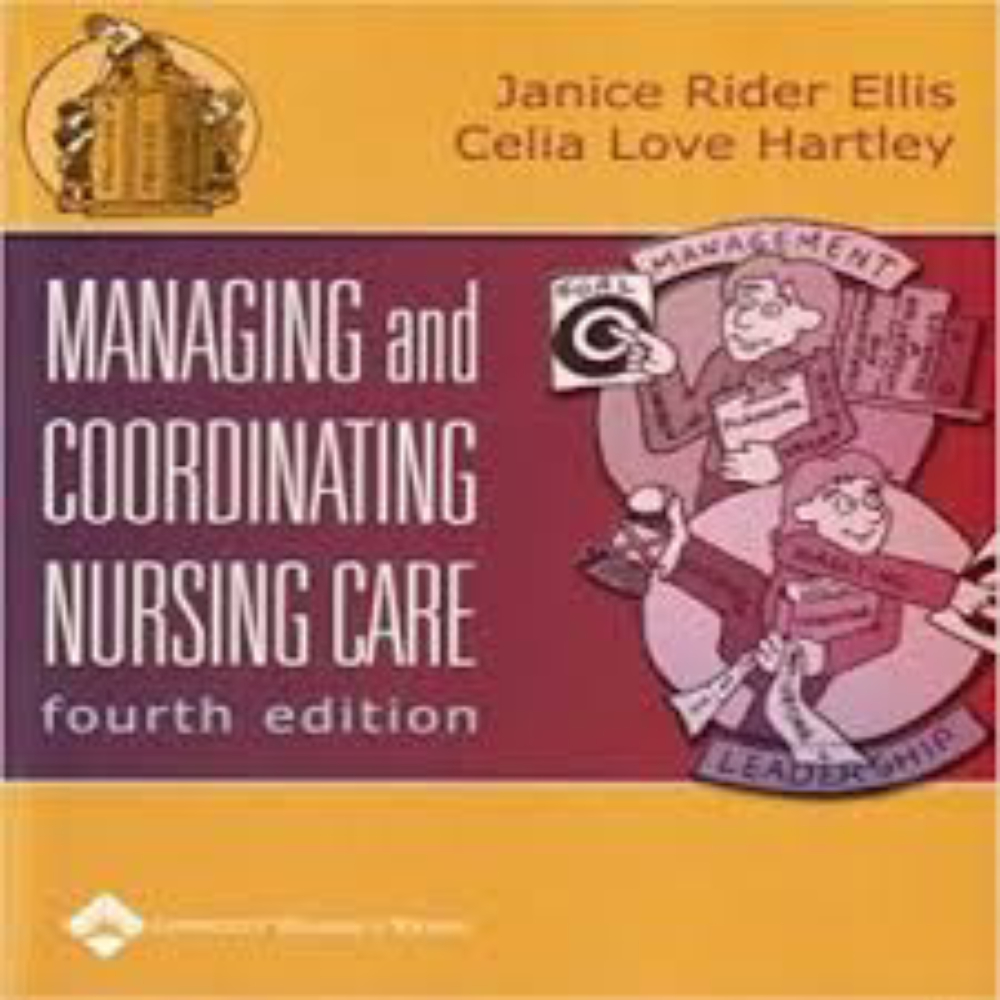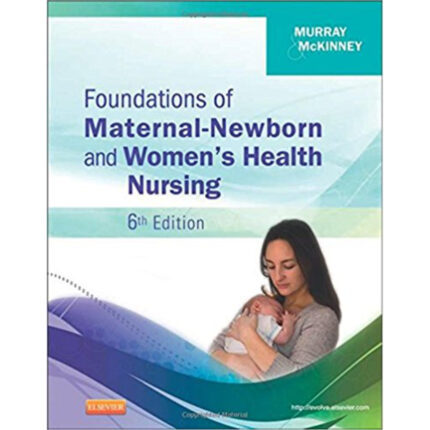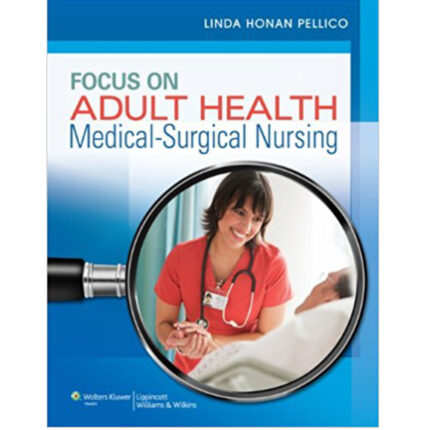Managing & Coordinating Nursing Care 4th Edition By J.K – Test Bank
1. An RN is serving as a preceptor to a nursing student. How might this nurse best evaluate the nursing student’s competence in decision making?
A) Watch to see whether the nursing student takes the correct action.
B) Ask the nursing student to explain the reasoning used to arrive at a decision that was made.
C) When the nursing student asks a question, be sure to answer it fully so that the student understands the process.
D) Observe the outcomes of the nursing student’s patient care.
2. Which of the following demonstrates the technical competence of the nursing assistant whom the nurse is supervising?
A) The nursing assistant helps the client to move up in bed by putting an arm firmly under the armpit of the client and pulling upward.
B) The nursing assistant bends over from the waist to help the client rise from the chair.
C) The nursing assistant takes the client’s oral temperature right after the meal that included hot coffee.
D) The nursing assistant estimates the amount of fluid that was consumed from each beverage of the meal to record intake and output.
3. The nurse is planning to administer an intravenous medication to a client. Which of the following behaviors best demonstrates technical competence?
A) The nurse checks a medication reference book for compatibility of this medication with the intravenous fluid being administered.
B) The nurse asks the charge nurse whether this medication is compatible with the intravenous fluids currently being administered.
C) The nurse plans to flush the intravenous line with a large volume of saline before and after the administration so that compatibility is not an issue.
D) The nurse asks the physician whether the medication is compatible with the ordered intravenous fluids.
4. What is one way an employer can evaluate your interpersonal competence?
A) By including peer review in your evaluation
B) By asking your patients about you
C) By observing you interact with others socially
D) By asking you
5. What is the most important support for enhancing your own competence as a professional nurse?
A) Having an employer that pays for continuing education
B) A personal commitment and desire to learn and grow
C) The availability of online education
D) The accessibility of advanced-degree programs
6. What aspects of technical skills should you examine as part of a self-evaluation of technical competence?
A) Technique only
B) Dexterity and technique
C) Organization and speed
D) Technique, organization, dexterity, and speed
7. Which action demonstrates institutional commitment to linguistically appropriate care?
A) A physician asks clients what language they are most comfortable speaking.
B) Consent documents are provided in commonly used languages in addition to English.
C) A nurse seeks information about the cultural background of each client.
D) A clinic patient is cared for by a person who speaks his language.
8. A nurse has recognized that a client does not understand the language in use on a consent form and requests a translator for the individual. This is most clearly an example of:
A) Interpersonal competence
B) Psychomotor competence
C) Decision-making competence
D) Cultural competence
9. According to Myer, what are the challenges to becoming culturally competent? (Mark all that apply.)
A) Believing that one’s own cultural patterns are the “best”
B) Always providing a translator when your patient does not speak English
C) Communicating effectively across differences in language
D) Trust
E) Knowledge about clinical differences in health patterns
10. A hospital has decided to test nurses in regard to their responses in different simulated situations. This is most clearly an example of evaluating for:
A) Cultural competence
B) Interpersonal competence
C) Decision-making competence
D) Technical competence
11. What important competence in nursing was not included in the National Council of State Boards of Nursing statement on nursing competence?
A) Technical competence
B) Interpersonal competence
C) Decision-making competence
D) Cultural competence
12. Susan is considering applying for a promotion in the hospital in which she works. The position she is applying for is a clinical position and her supervisor suggested that Susan find a way to demonstrate her competence when she is interviewed for the position. What would be the best way to accomplish this?
A) Bring letters of reference from her co-workers to the interview
B) Bring a professional practice portfolio to the interview
C) Bring a list of references to the interview
D) Bring recommendations from the physicians to the interview
13. Stephen is being interviewed for a position as a new grad RN in a local emergency department. One question Stephen was asked was “how would you maintain continued competence as a registered nurse?” What answer should Stephen give? (Mark all that apply.)
A) I would always do my best.
B) I would always attend the skills check-off times offered by Staff Development.
C) I would attend continuing education related to my field of nursing.
D) I would ask my nurse manager to observe me working.
E) I would ask my clients to write letters to my manager about me.
14. What paper began the current emphasis on continued competence for health care professionals?
A) The American Nurses’ Association White Paper on Health Care
B) The Pew Health Professions Commission report
C) The National Council of State Boards of Nursing Reflective Practice report
D) The American Medical Association’s report on medical errors
15. Working in a multicultural environment requires the use of both interpersonal skills and ______________competency.
16. You are a nurse working in a major metropolitan hospital that has just announced that it is changing its annual evaluation process to include each professional staff member establishing a plan for maintaining and enhancing his or her own competence. What would you include in your plan?
A) A professional practice portfolio
B) Two fliers from continuing education programs you want the hospital to send you to
C) A copy of your basic CPR card
D) A chart of local hospitals and the salaries they pay
17. The client expresses fear regarding the outcome of a diagnostic test that has just been performed. In responding to this client, which behavior/statement by the nurse best represents interpersonal competence in the nursing caregiving role?
A) “I am sure you have questions. I will call the doctor to talk with you.”
B) “Would you like me to call your family for you?”
C) “Waiting for results can be difficult. What questions do you have at this time?”
D) “I am sure that things will turn out just fine.”
18. A nurse has just taken a class and been certified to place peripherally inserted central catheters. This is most clearly an example of:
A) Interpersonal competence
B) Psychomotor competence
C) Decision-making competence
D) Cultural competence
19. Joe has made several significant medication errors over the past three months. Two of those errors have impacted the client in a negative way. Because of the errors he has made, Joe has been reported to his State Board of Nursing by the hospital that employs him. How do licensing agencies ensure competence of an individual who has demonstrated problem performance in a nursing role?
A) Development of a portfolio
B) Remediation and monitoring
C) Peer review
D) Employer review
20. What is an effective strategy to evaluate your own decision-making competence?
A) Seek out tests such as the NCLEX-RN preparation materials.
B) Examine client outcomes only because they are the key.
C) Examine whether you complete your work on time.
D) Debrief after a decision-making situation by reviewing your entire decision- making process.
Answer Key
1. B
2. D
3. A
4. A
5. B
6. D
7. C
8. D
9. A, C, D, E
10. C
11. D
12. B
13. B, C
14. B
15. Decision-making
16. A
17. C
18. B
19. B
20. D













Reviews
There are no reviews yet.